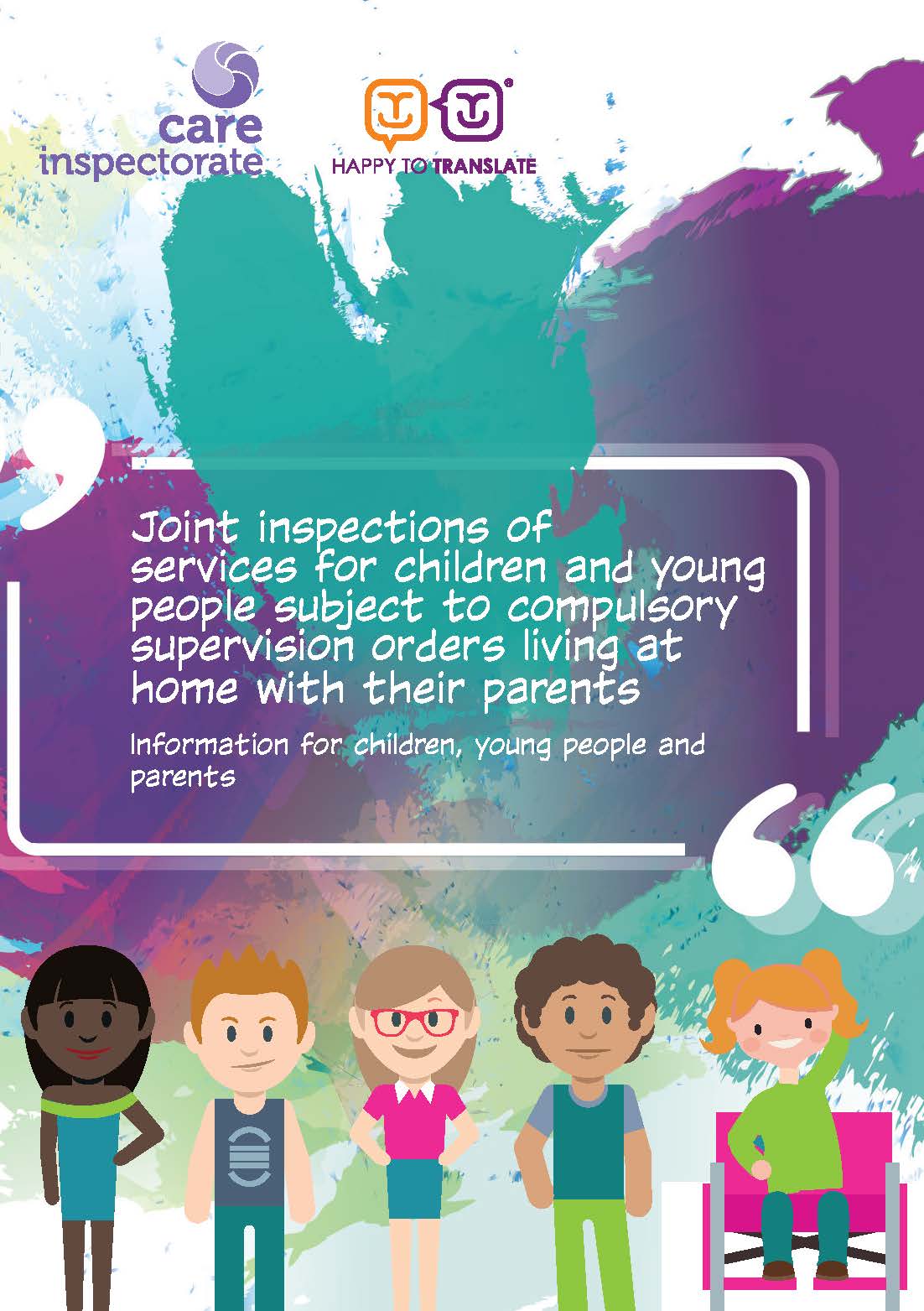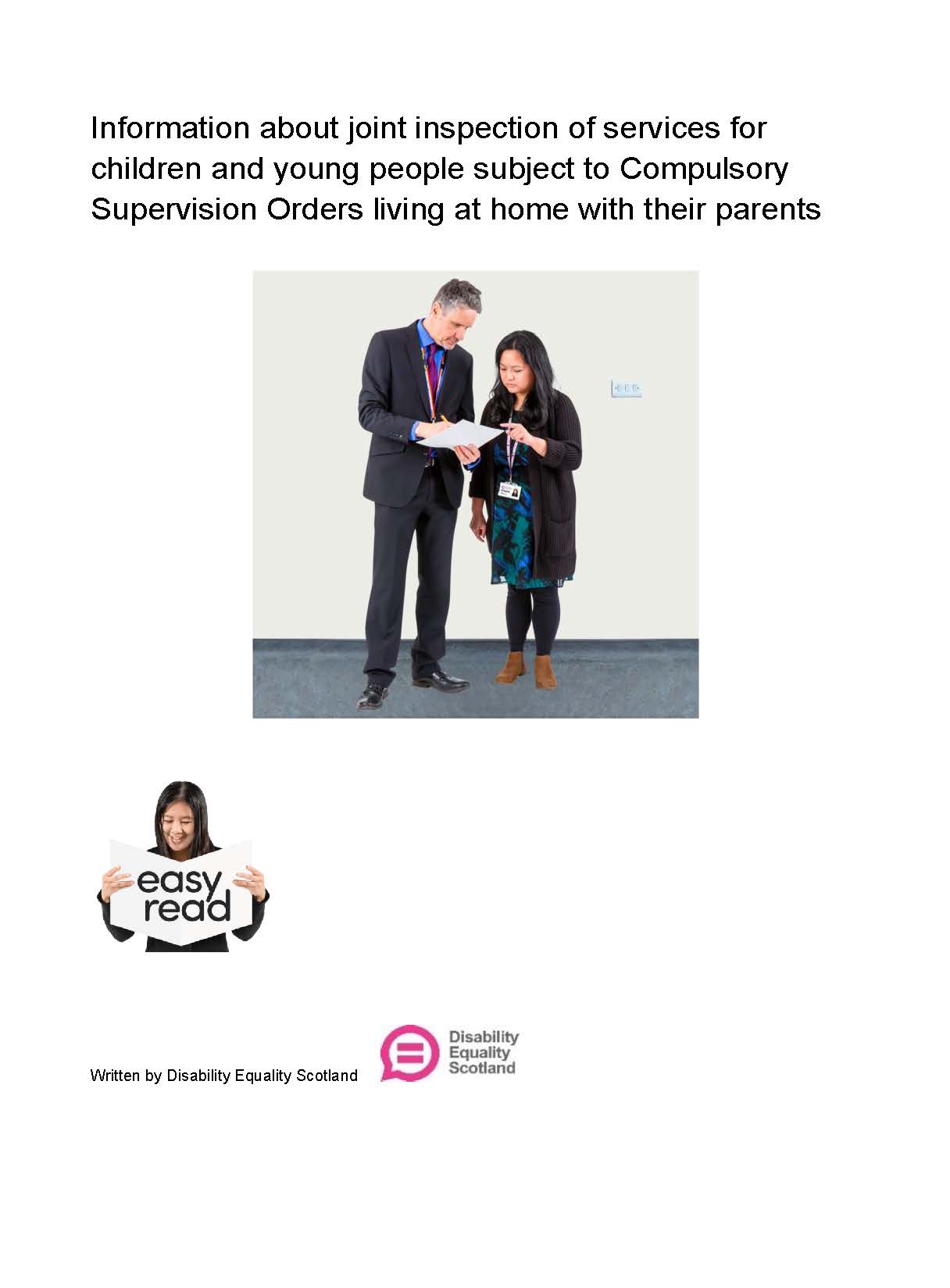Background information
The focus of our joint inspection - children and young people subject to compulsory orders and living at home with their parents
In August 2025 we published a review of findings from the joint inspection programme 2021 - 2025 which summarised and reflected on the findings from joint inspections of services for children and young people at risk of harm within 15 community planning partnership areas. Aside from joint inspections, we also undertook a series of thematic reviews on specific topics including secure care; cross border placements; services for disabled children and young people and services for care experienced young people.
The last time that we carried out joint inspections of services for children who are looked after was between 2018 and 2020, in our joint inspections of services for children in need of care and protection. In our overview report we noted that:
- Children and young people subject to compulsory supervision orders and living at home with parents experienced the least improvement in their wellbeing, when compared to children looked after away from home in kinship, foster or residential care.
- Partnerships struggled to find the evidence to demonstrate tangible improvements in the wellbeing of looked after children and young people and in understanding performance trends concerning different looked after groups.
- There had been some progress in narrowing the educational attainment gap between looked after children and their peers, however, it remained too great.
- Not all care experienced children and young people had the same opportunities to share their views and meaningfully influence service delivery.
- The collaborative leadership of child protection was much more robust and embedded than that for corporate parenting.
There are also a range of other evidence sources that indicate there is a need for further exploration of the impact of services for children and young people subject to compulsory supervision orders and living at home with parents. In particular, Scottish Government’s publication: “Educational Outcomes for looked after children 2022/23” evidences lower school attendance rates, higher school exclusion rates, lower positive destination rates and poorer attainment rates for children looked after at home, when compared to the wider group of looked after children.
By considering the experiences of children who are subject to compulsory supervision orders and living at home with their parents, we aim to better understand what is helping to improve outcomes for children and young people and what is getting in the way.
Our three key lines of enquiry are:
- Children and young people are well supported to live with their families. This support helps to keep them safe, overcome difficulties and makes a positive difference in their lives.
- The services children and young people receive are well planned and delivered in a way which is compassionate and by staff who put children and young people at the heart of decision-making. People in the workforce ensure that children, young people and parents are meaningfully listened to, heard and included.
- Leaders and managers work well together to create and maintain a joined-up system of care which delivers the right services to each child at the right time. This provides children and young people, their parents and the workforce with help, support and accountability.
Information for inspection coordinators
Through a joint scrutiny approach, we will consider the experiences and views of children and young people. We will explore how well services are directed and delivered to ensure children are supported to live at home within their families to achieve positive outcomes.
Timeline
The principles of joint inspection
Our approach and framework
Reporting
Other helpful documents
Timeline
Preparation (weeks 1-4)
- Week 1 - notification
- Week 2 - meet coordinator and participation lead
- Week 3 - submission of pre-inspection return
- Week 4 - submission of document return
- Week 4 - arrange and open surveys
Gather and analyse evidence (weeks 5-10)
- Week 5 - professional discussion 1
- Weeks 4-8 - children and young people, and parents and carers' surveys
- Weeks 4-7 - staff survey
- Week 6 - inspection team analyse written evidence
- Week 8 - review of childrens records
Onsite acticity and final analysis (weeks 11-14)
- Week 11 - professional discussion 2
- Week 12 - onsite engagement with staff, children, young people and famileis
- Week 13 - inspection team final anaysis
Reporting and publication (weeks 15-21)
- Week 15 - professional discussion 3
- Week 17 - quality anad consistency panel
- Week 17 - partnership recieve first draft of report
- Week 20 - partnership receives embargoed report
- Week 21 - report publication and video publication
- After week 21 - post-inspection follow up
The principles of joint inspection
We will use a rights based approach in the joint inspections, embedding the experiences of children and young people at the heart of planning, implementation and analysis of findings. Our joint inspections are underpinned by the United Nations Convention on the Rights of the Child. For example we respect the right of children and young people to have their views heard by making participation of children, young people and families a core element of our approach. Our approach and design will reflect what children and families have told us matter the most to them, as encapsulated within the Promise.
We will consider the planning and progress that has been made by children’s services partnerships as they seek to keep The Promise. We will consider the five Promise Foundations and related priorities of family, care, voice, people and scaffolding which enable children to grow up loved, safe and respected.
Our approach and framework
Our approach will be proportionate to the evidence required, with a hybrid model of on-site and virtual activities. Our methods will include gathering information from local partnerships about the relevant services they provide and reviewing publicly available documents.
We will use the quality framework for children and young people in need of care and protection (November 2022). This framework is informed by the principles of the European Framework for Quality Management (EFQM) model which incorporates three tenets:
Direction – clarity of purpose and strategy to achieve aims
Execution – implementation of the strategy through delivery
Results – what results have been achieved
Reporting
We will publish one written report following each joint inspection. We are committed to improving accessible reporting specific to children and young people, this will involve further consultation with our young inspection volunteers.
In our report we will consider these three key lines of enquiry.
Children and young people are well supported to live with their families. This support helps to keep them safe, overcome difficulties and makes a positive difference in their lives.
The services children and young people receive are well planned and delivered in a way which is compassionate and by staff who put children and young people at the heart of decision-making. People in the workforce ensure that children, young people and parents are meaningfully listened to, heard and included.
Leaders and managers work well together to create and maintain a joined-up system of care which delivers the right services to each child at the right time. This provides children and young people, their parents and the workforce with help, support and accountability.
We will evaluate four quality indicators on our six-point scale. These are:
- Quality indicator 2.1: Impact on children and young people
- Quality indicator 5.3: Care planning, managing risk and effective intervention
- Quality indicator 5.4: Involving individual children, young people and families
- Quality indicator 9.2: Leadership of strategy and direction
Other helpful documents
The activities we will undertake
During the inspection, a team of inspectors from the Care Inspectorate, Education Scotland, HM Inspectorate of Constabulary Scotland and Health Improvement Scotland will:
- speak with the staff
- speak with children and young people and listen to their views
- speak with parents and carers
- read information about the children and young people.
This gives us the chance to find out if children, young people and their families are getting the help that they need and if services are making a difference to their lives. What individual people tell us during inspection is confidential. Our reports do not include any information about them or their family, or anything that could identify them. However, we do have a duty to pass on information if there are concerns about someone’s safety.
Surveys – we have surveys for children, young people and families and we use and safeguard the data gathered from these in the same way as we do with what you tell us in person. Our approach to participation during inspection reflects the importance we give to hearing from children and young people. We also have a staff survey which also enables us to maximise the feedback we get from those working across services.
After our inspection, we publish a report on our website about what we found for the area. Our inspection reports set out what works well and what could improve. We expect the community planning partnership to take action on any recommendations we make for improvements.
How long these inspections will last
Our inspections last for a number of months. We collect information about the area before we visit it. This helps us to understand what happens there and what is affecting the way that services are being provided.

Preparation (weeks 1-4)
- Week 1 - notification
- Week 2 - meet coordinator and participation lead
- Week 3 - submission of pre-inspection return
- Week 4 - submission of document return
- Week 4 - arrange and open surveys
Gather and analyse evidence (weeks 5-10)
- Week 5 - professional discussion 1
- Weeks 4-8 - children and young people, and parents and carers' surveys
- Weeks 4-7 - staff survey
- Week 6 - inspection team analyse written evidence
- Week 8 - review of childrens records
Onsite acticity and final analysis (weeks 11-14)
- Week 11 - professional discussion 2
- Week 12 - onsite engagement with staff, children, young people and famileis
- Week 13 - inspection team final anaysis
Reporting and publication (weeks 15-21)
- Week 15 - professional discussion 3
- Week 17 - quality and consistency panel
- Week 17 - partnership recieve first draft of report
- Week 20 - partnership receives embargoed report
- Week 21 - report publication and video publication
- After week 21 - post-inspection follow up
What we will look at on inspection
By considering the experiences of children who are subject to compulsory supervision orders and living at home with their parents, we aim to better understand what is helping to improve outcomes for children and young people and what is getting in the way.
Our three key lines of enquiry are:
- Children and young people are well supported to live with their families. This support helps to keep them safe, overcome difficulties and makes a positive difference in their lives.
- The services children and young people receive are well planned and delivered in a way which is compassionate and by staff who put children and young people at the heart of decision-making. People in the workforce ensure that children, young people and parents are meaningfully listened to, heard and included.
- Leaders and managers work well together to create and maintain a joined-up system of care which delivers the right services to each child at the right time. This provides children and young people, their parents and the workforce with help, support and accountability.
In our inspection report we will consider these three key lines of enquiry. We will evaluate four quality indicators from our quality framework using the six-point scale. These are:
- Quality indicator 2.1: Impact on children and young people
- Quality indicator 5.3: Care planning, managing risk and effective intervention
- Quality indicator 5.4: Involving individual children, young people and families
- Quality indicator 9.2: Leadership of strategy and direction
Children and young people have told us about the importance of being able to experience sincere human contact and enduring relationships. Our approach therefore looks carefully at how well services and systems are organised so that children and young people can experience continuity in their care and develop and sustain lasting relationships. Our inspections also consider whether legal measures are being used appropriately to achieve security and stability for children.
Staff who are well trained and who feel valued and empowered, are more likely to be able to provide high quality services for children and young people. We therefore explore how well staff are supported to carry out their task. Our joint inspections will look at the services provided for them by health workers (for example school nurses, health visitors and doctors), social workers, police officers and lots of other people who work with them and their families.
We know that partners recognise that assessment and planning are critical to ensure the safety of, and improving outcomes for, children and young people. However, we also know that performance in assessment and planning is not as consistently strong across the country as it needs to be. We will look to see if robust quality assurance and high-quality reflective supervision are in place to support these important processes.
Strong collaborative leadership is essential and challenging in the context of providing high quality public services in an integrated landscape. We consider the effectiveness of leadership and how well leaders can demonstrate what difference they are making to the lives of children and young people.
Information for staff
One of the foundations of the Promise is about supporting families to stay together and emphasis is placed on the importance of providing timely support to ensure children can stay in their families wherever it is safe to do so. By considering the experiences of children who are subject to compulsory supervision orders and living at home with their parents, we aim to better understand what is helping to improve outcomes for children and young people and what is getting in the way.
- What we will look at on inspection
- How long these inspections will last
- What activities we will undertake
- Reporting
Information for children, young people and families
What you think really matters. If we are inspecting your area, and you have experience of services, you may want to speak to us about the help that you have been getting.
What you tell us will help us find out what is working well and what could be improved about the care and support for children and young people. At the end of the inspection we will write a report and we will feedback to children and young people about what we have found.
Please review our privacy notice.
Information for children, young people and parents
Information for parents – easy read
Children and young people subject to compulsory supervision orders
Joint inspection of services for children and young people subject to compulsory supervision orders living at home with their parents
In August 2025 we started working with our scrutiny partners to take a more focused look at the experiences and outcomes of children and young people subject to compulsory supervision orders and living at home with parents. On the 8 July 2025 we hosted a webinar to share our plans. We will complete up to four inspections with this focus by April 2026.
More information:
- Information for children, young people and parents
- Information for staff
- Information for inspection coordinators
- Background information
Public protection
Public protection - enhancing our culture of learning through independent scrutiny and inspection
The scrutiny, inspection, assurance and regulatory advisory group is aligned with the national public protection leadership group. It is chaired by Craig Naylor, His Majesty’s Chief Inspector of Constabulary in Scotland. It brings together independent scrutiny bodies in response to “Priority 2 - enhancing our culture of learning through independent scrutiny and inspection” of the leadership group’s workplan. The advisory group is independent and is not a subgroup of the leadership group and the relationship between the two groups is best described as a critical friendship.
The work of the advisory group is supported by the public protection scrutiny working group which brings together inspectors and representatives from scrutiny bodies, and other relevant agencies, to develop proposals to deliver effective and proportionate scrutiny of public protection and coordinate engagement with stakeholders.
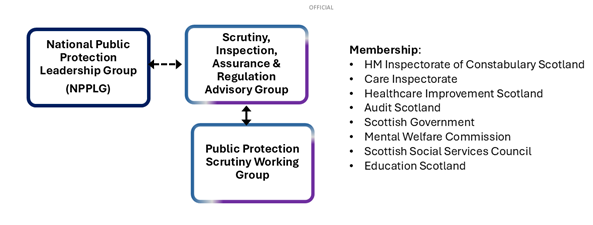
What is within the scope of public protection?
Public protection has six strands as described in the Chief Officers Public Protection Induction Resource and the national public protection leadership group terms of reference. These are:
- child protection
- adult support and protection
- violence against women and girls
- alcohol and drugs
- multi-agency public protection arrangements (MAPPA)
- suicide prevention.
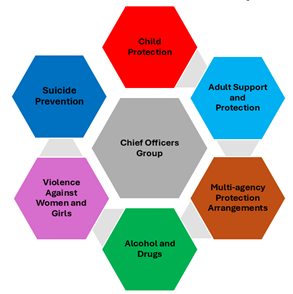
Principles
The working group has adopted a range of principles to make sure that scrutiny assurance of public protection will be:
- designed to support improvement
- mindful of minimising additional demands on partnerships - building on partnerships’ existing learning and improvement self-evaluation activities
- proportionate - based on risk and intelligence
- appreciative - focused on what works well
- collaborative - scrutiny bodies, working together with partnerships and people with lived experience
- innovative and make the best use of technology
- transparent and open.
Timescales
Phase 1 of the work has begun with a series of conversations over the summer to engage Chief Officers Groups (COGs) across the country. This reflects their key role in assuring public protection arrangements.
We are keen to get COGs’ views, advice and support to help us refine our thinking on:
- how scrutiny bodies can work with local partnerships and each other to improve assurance of public protection and outcomes for people of all ages.
- where COGs are confident that public protection is working well and why. This will include particular strands, such as child protection. It will also include crosscutting aspects such as communication and quality assurance/self-evaluation.
- where there are challenges and opportunities to improve. This will include where there have been successful improvements and where improvement remains more challenging.
Learning from this and engaging with wider stakeholders will inform the development of a future public protection methodology, which will commence in 2026.

More information
Further updates will be provided periodically on this webpage as the work progresses. For more information email This email address is being protected from spambots. You need JavaScript enabled to view it.
Error response form
What is the error response process?
The Public Services Reform (Scotland) Act 2010 specifies that the Care Inspectorate must produce a report for all inspections carried out. Section 57(2) also states that the provider of the inspected service must receive an initial draft of the report and an opportunity to comment on it.
Collaboration with you as a provider is key to our inspection approach. Ongoing professional dialogue and thorough inspection feedback make the process as transparent as possible and allows for discussion and clarification of any uncertainties early on. You also have opportunities to evidence any successes, achievements and plans for improvement throughout inspections. This collaborative approach should mean that the information in the draft report is familiar to you, and nothing comes as a surprise. However, we welcome your feedback and have an error response process which we encourage you to use. This fulfils our legal obligations and includes the error response form (ERF) for you to give your comments and feedback on the contents of the draft inspection report.
Other ways to feedback to the Care Inspectorate
We understand that sometimes you may wish to share your views on our general approach to inspections. The error response process is primarily about a specific inspection report, but there are other ways in which you can provide feedback to us.
For example, you can provide feedback using the Inspection Satisfaction Questionnaire process. If you are unhappy with how the Care Inspectorate has carried out our regulatory functions, you can make a complaint here.
Accessing the ERF
When we send you your draft report in eForms, we will include a letter prompting you to review it and return an ERF. This video shows you how to log into your eForms account.
Completing the ERF
Once you have reviewed the draft report you can respond to us by completing the ERF. We want to ensure the report is an accurate representation of the service at the time of the inspection and that the report is clear to the public. You can therefore comment on any aspect of the report.
You can access the ERF from the ‘documents’ section of your eForms (screenshot below). On a mobile device this may appear as a drop-down menu.

When you are in the documents page you should select ‘current’ from the menu on the left, or from the drop-down menu.
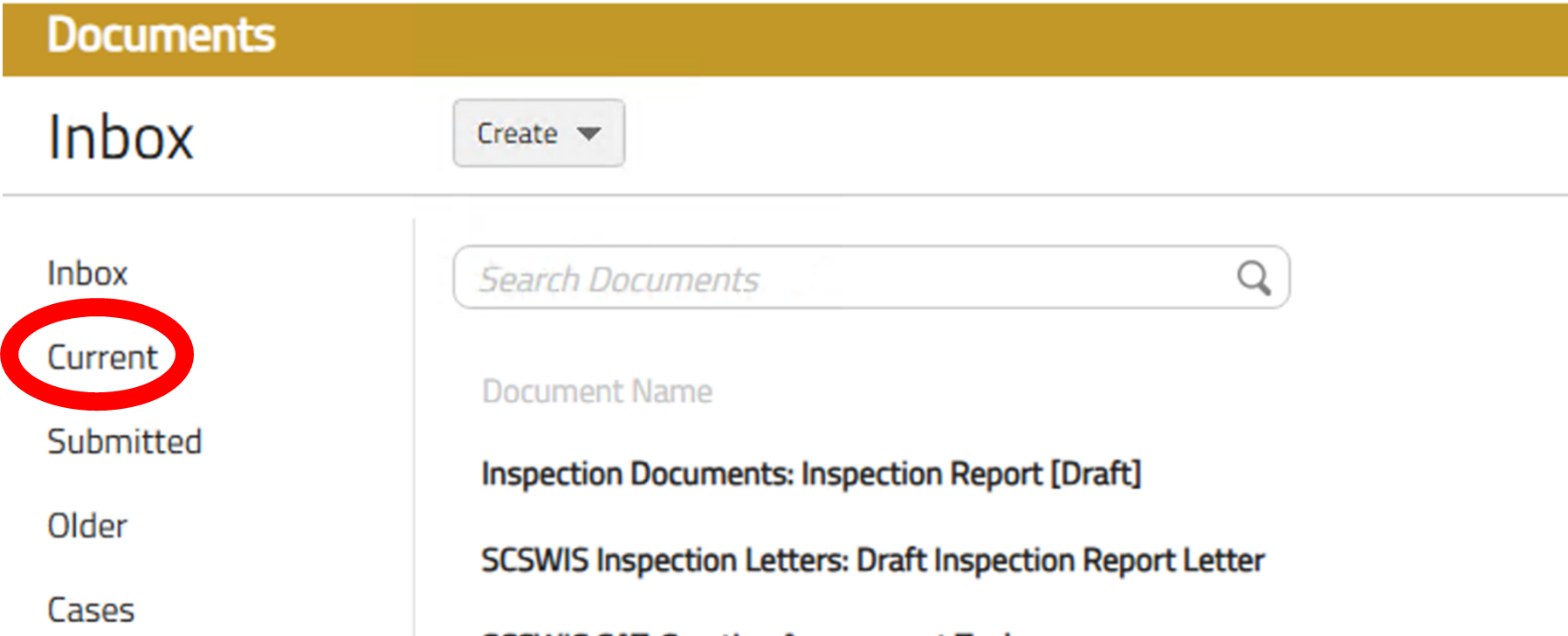
You will then see the ERF, which you can open by clicking on it.

When you open the form, you will have the option to select that you agree for us to finalise the report without changes. If you select that you agree and submit this to us, we will receive a ‘blank’ ERF stating that you agree for the report to be published without any changes. It will be finalised and appear on our website shortly after.
If you select that you do not agree to it being finalised without changes, you will then need to give us more details by completing the form. To tell us about the issues you have identified, you need to create an item on the form. You should use the ‘new’ button to create an item for each issue you have identified; this allows us to easily see each issue you are raising and respond to them in turn.
Complete each part of the form. Select the section of the report that your issue relates to from the drop-down menu. This means we can easily navigate to the correct area of the report to review it. If there is more than one issue in the same section of the report, create a new item for each one.
There are then two free-text fields for you to complete. In the ‘Describe the Error’ section you should explain the issue you have identified and, if helpful, copy the relevant section of the report text. Use the ‘Proposed Correction’ box to offer us your alternative suggestion for this section of the report.
There is also the option to upload attachments to the ERF. Please ensure these are relevant to the inspection, clearly named and referred to in the ‘Proposed Correction’ box. This allows the inspector to assess whether the attachment is relevant to our inspection findings.
You do not need to complete the form in one go; you can save it and return to it later. If you want to amend any item you have created, you can click on it to re-open and edit it. Once you are ready to send the ERF to us, click the submit button to send it through eForms.
You have 10 working days from receipt of the draft report to respond. Extensions to this may be agreed by your inspector in certain circumstances. If we do not hear from you in the agreed timescale, the report will automatically be finalised and published on our website.
The ERF is the only opportunity to comment on the report and once we respond to you with a letter, the report will usually be finalised and published on our website. To ensure we can respond appropriately, please be clear when describing any issues and proposed corrections and make sure you create new items for each issue.
Please note the inspection completion date that appears on the front page of the report is the date formal feedback was given and is populated on the report automatically by our systems. The service details reflect the details we have on the digital portal. You can review these and keep them up to date by logging into the digital portal.
How we respond
When we receive an ERF, the lead inspector will respond to you using our error response letter. This is sent from the eForms system in the same way as the ERF. Our timescale for this is 10 working days from the date the ERF is submitted. If we need longer than this to respond, for example due to staff absence or needing more time to review our evidence, the inspector will advise you of this.
In all but very exceptional circumstances (see below) the process is complete once we have sent the error response letter, and the report will be published on the website.
If we need to clarify any of the points raised, the lead inspector will contact you to arrange a telephone call or meeting, to ensure we provide an accurate response.
A team manager or more senior manager from the Care Inspectorate may also be involved in reviewing the inspection evidence with the lead inspector and advise on any changes. The letter will outline if a team manager or anyone else has been involved.
It is important to note that, if you ask us to amend our draft report or revise the evaluations (grades) awarded, we may need to review all our evidence from the inspection to reach a conclusion. This is because our findings are based on our overall assessment of the evidence we look at. Evaluations (grades) are based on our grading criteria, which requires us to consider the strengths and weaknesses of a service based on the evidence we have gathered.
There are certain circumstances in which we may accept your proposed correction and amend our report. These include where our review of the evidence shows that:
- the report contains factual inaccuracies, such as names, times, dates and places,
- the report does not reflect an accurate representation of the evidence,
- evaluations (grades) are based on inaccuracies or discrepancies in the evidence,
- evaluations (grades) can be demonstrated to be unjustified as they are not reflective of the relevant evidence (which is not in dispute).
In most instances, if you tell us, in your ERF, that you feel the evaluation (grade) we have awarded is inaccurate against our grading criteria, a team manager will review the evidence gathered on inspection, and any additional evidence with the inspector. They will reach a conclusion as to whether this supports a change in evaluation (grade).
Depending on the findings from their review, the team manager could conclude:
- the proposed evaluations are appropriate,
- the proposed evaluations be increased,
- the proposed evaluations be decreased.
If the team manager concludes that the evidence does not support the evaluation (grade) in the draft report and a higher evaluation (grade) is more accurate, we will inform you of this in our response letter. The report and evaluations will be amended and published on our website.
In very rare circumstances, the team manager may conclude that a lower evaluation than the one originally awarded is more appropriate. In these exceptional cases, the error response letter will clearly explain why this decision has been made. We will arrange a meeting with you to explain our decision and the processes that have been followed. You will then have an opportunity to make comment on the revised draft report by email before it is finalised.
If our review of the evidence does not identify any errors, we will not make changes to the report. This will be clearly stated in our response letter.


